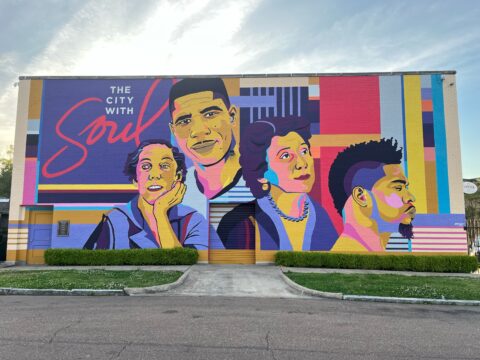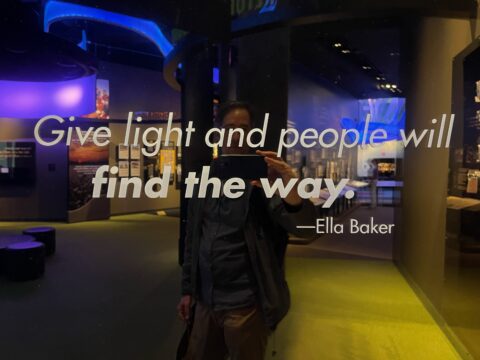Mississippi Learnings: Deep Trust, Values, Accountability and Faith as and for “System Change”
May 5, 2023 1 CommentI have been trying to capture my learning from the past few days in Mississippi. I feel pretty shifted by the experience, in directions that we at IISC have been pointing towards (along with partners such as the Mississippi Food Justice Collaborative, Food Solutions New England, The Full Frame Initiative, National Parent Leadership Initiative, and many others), though now personally I feel it at another level of depth and conviction. For that I am so grateful.
This is something that I put into a digital journal as I was traveling home to capture what was moving through me:
“Just leaving Jackson, Mississippi, where I was for three days, co-facilitating and participating in a gathering convened by the Johns Hopkins Center for a Livable Future of food policy councils from around the country (US) that are trying to advance social equity in their work. It was incredibly powerful to me to gather in Jackson, for all its history; to meet the likes of Reena Evers-Everette (daughter of Medgar and Myrlie Evers), Charles Taylor (head of the NAACP-Mississippi), Savi Horne (Land Loss Prevention Program), Ed Whitfield (Seed Commons) and Dr. Cindy Ayers-Elliott (founder of Foot Print Farms); and also to learn more from colleagues there about the network weaving and healing work they are doing in and around food systems, which is about so much more than food – community, local economy, and culture.
As I was walking through the Mississippi Civil Rights Museum about two hours after we closed the convening, I was hit in the forehead and heart (literally had to sit down) by the messages from both the history I was taking in and also what I had just experienced in Jackson. And I should add that it links to the work we at IISC have been supporting through Food Solutions New England for over a decade. To distill “success” (or encouraging movement) in the Civil Rights movement (especially in Mississippi) and what is happening now in Mississippi and in New England around food systems change, much seems to come down to this:
- Foregrounding relationships and relational culture, and especially bridging beyond bonding (like-to-like)
- Being grounded in core values and principles that are co-created and co-evolved
- Establishing, collectively, accountability structures and processes focused on the values and principles and maintaining relational culture
- Relentlessly keeping those who are most negatively impacted by the existing system(s) at the center, not to exclude or peripheralize others, but rather to make sure their experiences-voices-ideas-advocacies serve as a guidepost for systemic redesign (the curb cut effect suggests that when we design for those who are most marginalized, we catch others up in the process)
- Grounding in the anchoring power of faith, which may or may not be religiously-sourced, and nonetheless is about having humility in the face of Life’s gifts and grandeur, which is complex and awe-inspiring, and asks us to both never give up but also to let go …
On top of this, or infused with this, comes the work for policy change, creating new civic infrastructure, and the like, and never losing sight of the list above.
One peril, over and over again, in social/system change work, seems to be the pitfalls of abstraction – making what we are doing too intellectual and inaccessible to most, not to mention unactionable; not addressing the abstractions that people make of one another in systems (seeing someone only as their role, or other aspects of identity); inappropriately “scaling” or “franchising” efforts and not shaping the work to real places where there may be some familiar patterns but always uniqueness in terms of history and culture.
Another peril is perpetuating fragmentation – not working with living breathing wholes, siloing our “knowing” to overly intellectual/analytical thinking, failing to integrate/weave strategies and perpetuating unhelpful competition (playing into the oligarchic capitalist narrative and way of doing things).”
Now reflecting on this a few days later, something else comes up, which is the importance of ongoing work on ourselves as “change agents,” care-fully watching our own automatic tendencies, biases, and inclinations (including towards groupthink), and especially being careful of the rearing of the overly pride-full ego in the forms of fear, envy, greed and striving for control. Much seems to come down to the abiding power of Love (and from it the expression when necessary of “holy rage”) and the never-ending practice of making room for regenerative flows …
Still sitting with it all, and curious to hear reactions, resonances and other reflections …


1 Comment
Born in Mississippi, Graduated from Jackson public schools, worked for City of New York during clean-up of Ground Zero, raised a son in Brooklyn, returned home and started a second career. And I’m still wondering “what is going on?” People ask me, “why did you come back home?” And I’m speechless [because it’s my home?]. For all the people I grew up with who left and have sworn never to return, I get it. But I don’t.